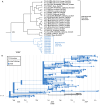Notes from the Field: Mpox Cluster Caused by Tecovirimat-Resistant Monkeypox Virus - Five States, October 2023-February 2024
- PMID: 39388389
- PMCID: PMC11466377
- DOI: 10.15585/mmwr.mm7340a3
Notes from the Field: Mpox Cluster Caused by Tecovirimat-Resistant Monkeypox Virus - Five States, October 2023-February 2024
Abstract
The antiviral drug tecovirimat* has been used extensively to treat U.S. mpox cases since the start of a global outbreak in 2022. Mutations in the mpox viral protein target (F13 or VP37) that occur during treatment can result in resistance to tecovirimat† (1,2). CDC and public health partners have conducted genetic surveillance of monkeypox virus (MPXV) for F13 mutations through sequencing and monitoring of public databases. MPXV F13 mutations associated with resistance have been reported since 2022, typically among severely immunocompromised mpox patients who required prolonged courses of tecovirimat (3-5). A majority of patients with infections caused by MPXV with resistant mutations had a history of tecovirimat treatment; however, spread of tecovirimat-resistant MPXV was reported in California during late 2022 to early 2023 among persons with no previous tecovirimat treatment (3). This report describes a second, unrelated cluster of tecovirimat-resistant MPXV among 18 persons with no previous history of tecovirimat treatment in multiple states.
Conflict of interest statement
All authors have completed and submitted the International Committee of Medical Journal Editors form for disclosure of potential conflicts of interest. Todd G. Smith reports that SIGA Technologies, the owner of TPOXX, provided the drug used in the study under a material transfer agreement. Nicole M. Green reports serving as president of the Southern California Society for Microbiology. Daisy McGrath reports support from the Oak Ridge Institute for Science and Education. Meilan Bielby reports unpaid membership on the Association of Public Health Laboratories (APHL) Infectious Disease and Public Health Preparedness committees. Danielle Haydel reports institutional support from APHL to attend the APHL conference. No other potential conflicts of interest were disclosed.
Figures

References
MeSH terms
Substances
LinkOut - more resources
Full Text Sources
Medical

